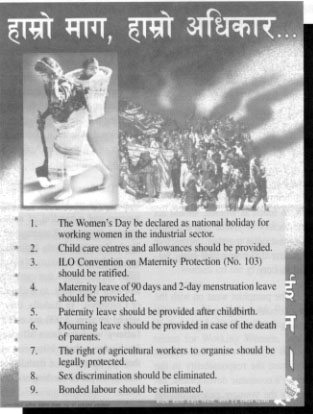Indonesia
"I admire our friends at CAW because you can celebrate International Women's Day. We in Indonesia are unable to do so because that day was the inauguration of the new parliamentary session in which the president and vice-president were to be selected. On that day, any mass gatherings, even seminars and discussions, were banned. Many NGOs were forced to organise their own activities."This was a lone cry from sisters in YASANTI, Indonesia. But they were by no means isolated from this international event. Sharing the spirit of collective struggle, some groups did try their best to organise small scale activities despite threats from the repressive regime. Humanika Surabaya Indonesia was invited as the resource person on industrial women workers' issues in the workshop organised by the Centre of Women's Study, Airlangga University. Participating NGOs, students and lecturers shared their views on the theme 'Efforts to Eradicate Any Kind of Discrimination Against Women in Indonesia'.
Nepal
Following last year's decision national women workers' meeting annually on International Women's Day, Central Women Workers' Department of GEFONT organised its second national meeting on February 24-28. Some 40 woman worker
Speaking at the meeting, CWWD coordinator, Bidhya Bhandari, hit the punch line by mentioning that women workers issue is not only an issue for women: it should be a trade union issue as well. She appealed that women should be able take an equal part in all movement, including trade unions, to overcome all kinds of discrimination in society.
The 5-day event included a 3-day trainer's training which covered gender sensitivity courses as well. On the fourth day, participants went to Tokla Tea Estate, one of the oldest and biggest tea estate in Nepal, for exposure. The participants had direct talks with women workers in the estate, and after going back to the venue, the
Experience did not only stay in the mind. The spirit and commitment of Nepalese working women to fight against discrimination and exploitation ran high in the Kathmandu rally